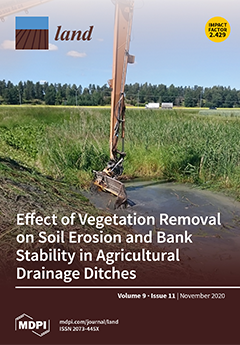Resources
Displaying 1196 - 1200 of 2258Contaminated Land by Wildfire Effect on Ultramafic Soil and Associated Human Health and Ecological Risk
The purpose of this study is the evaluation of fire effect on contaminated land and the assessment of the associated risk of human health and terrestrial ecological receptors. Ash and soil samples were gathered from burned and unburned areas (central Evia, Greece) which are adjacent with a Natura 2000 area. The geochemical dataset includes 20 sampling sites and 35 elements. The wildfire severity was investigated by applying a macroscopic approach and field observations. Statistical and spatial analysis were applied for delineating the distribution of elements in ash and soil.
A New Hypothesis on Informal Land Supply, Livelihood, and Urban Form in Sub-Saharan African Cities
In sub-Saharan Africa, the urban majorities are financially excluded from the formal housing markets and reside in informal settlements. Limited knowledge on the development of informal settlements compromises the efficacy of urban planning and policies targeting such areas. This study presents an analysis of informal urban land use in four major cities in East Africa, as well as an analysis of urban form and household conditions in a case study area in each city.
Erratum: Lee, J.-H.; Kim, D.-K. Mapping Environmental Conflicts Using Spatial Text Mining. Land 2020, 9, 287
The authors would like to correct the following section of this paper [...]
Climate-Wise Habitat Connectivity Takes Sustained Stakeholder Engagement
Well-managed and connected protected area networks are needed to combat the 6th mass extinction, yet the implementation of plans intended to secure landscape connectivity remains insufficient. The failure to translate planning efforts into effective action (i.e., the research-implementation gap) hinders our ability to conserve biodiversity threatened by ongoing climate change and habitat fragmentation.
Environmental Impacts of Planned Capitals and Lessons for Indonesia’s New Capital
Indonesia’s new planned capital in East Kalimantan is being touted as a “smart, green, beautiful and sustainable city” but has stoked fears of massive environmental damage to the island of Borneo, one of the world’s most important biodiversity hotspots and carbon sinks. Precedents of other planned capitals can contribute to an understanding of the potential long-term impacts of Indonesia’s new capital.


